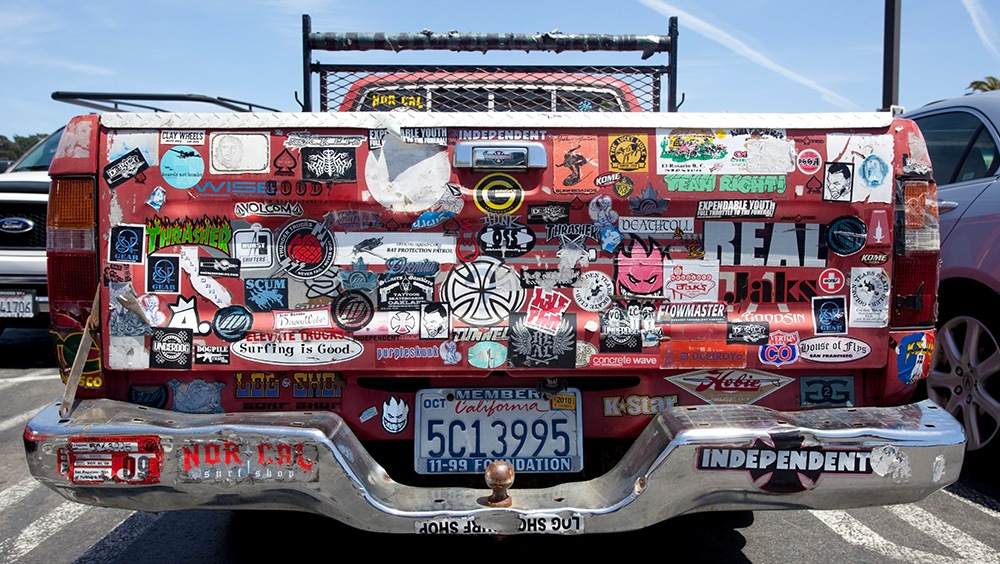Are Bumper Stickers Free Speech?

One of the more common forms of personal expression is the bumper sticker. It is an inexpensive way for people to convey political messages, support their favorite sports team, engage in parody or satire, or tout their favorite band. The array of bumper stickers is almost endless.
When the government limits the display of bumper stickers, the government is censoring or regulating speech, and the First Amendment comes into play. Here's what you need to know about bumper stickers and free speech.
Censoring offensive bumper stickers
By far the most common First Amendment dispute involving bumper stickers involves regulating those that the government considers offensive or obscene. In fact, some states have laws that prohibit “patently offensive” or “obscene” bumper stickers.
For example, Tennessee law says:
“To avoid distracting other drivers and thereby reduce the likelihood of accidents arising from lack of attention or concentration, the display of obscene and patently offensive movies, bumper stickers, window signs or other markings on or in a motor vehicle that are visible to other drivers is prohibited and display of such materials shall subject the owner of the vehicle on which they are displayed, upon conviction, to a fine of fifty dollars ($50.00).”
Similarly, an Alabama law provides:
“It shall be unlawful for any person to display in public any bumper sticker, sign or writing which depicts obscene language descriptive of sexual or excretory activities. Any person convicted of a violation of this section shall be guilty of a Class C misdemeanor and shall be punished as prescribed by law.”
Both laws target bumper stickers that meet the legal definition of obscenity.
The legal definition of obscenity is narrow and applies to a narrow range of hard-core explicit sexual content. It is questionable whether a bumper sticker, which consists of language or images, could meet this definition. This is because the legal definition requires that the expression be patently sexual in nature, which bumper stickers generally aren’t. Also, to be legally obscene, bumper stickers must lack any serious artistic, literary, political or scientific messaging. They generally have some serious value, even if it is parody or satire.
For example, a driver in Georgia was cited for violating a Georgia law prohibiting bumper stickers “containing profane or lewd words describing sexual acts, excretory functions, or parts of the human body.” The driver had a bumper sticker that read “(Expletive) Happens.”
The Georgia Supreme Court ultimately agreed with the driver, writing in Cunningham v. State (1991) that “the peace of society is not endangered by the profane or lewd word which is not directed at a particular audience.”
Similarly, a federal district court in Alabama ruled that a trucker’s bumper sticker reading “How’s My Driving? Call 1-800-EAT-(Expletive)!” was not a form of obscenity. The judge explained in Baker v. Glover (1991) that the bumper sticker could not be legally obscene, as it “protected political speech under the First Amendment because it has serious literary and political value.”
More recently, Dustin Owens was cited in Nashville, Tennessee, for displaying a bumper sticker on his vehicle featuring a stick figure drawing of a sex act.
The bumper sticker was a parody and not legal obscenity. Owens filed a lawsuit asserting that his bumper sticker was protected speech and not even close to obscenity.
Nashville government officials dropped the citation after Owens filed his lawsuit.
On the other hand, a bumper sticker reading “I eat (expletive)” could conceivably be viewed as obscene, in the eyes of a federal judge in Florida.
Dillon Shane Webb was stopped by an officer, who thought Webb’s bumper sticker was obscene. The officer told Webb to remove a letter from the bumper sticker so it would not be obscene. Webb refused and was arrested, his vehicle searched and towed. Prosecutors declined to press charges, and Webb sued the officer for violating his civil rights. The lawsuit was dismissed. The judge said the officer had qualified immunity because it was reasonable, in the moment, for the officer to think the bumper sticker might be obscene.
Bumper stickers on vehicles of public employees
The question becomes more complex when discussing whether the government can regulate the bumper stickers of its employees. Public employees lose some of their rights to free speech related to their job or when their speech might impact how they or their government office might interact with the public.
Federal employees cannot engage in political activity while on the job under the Hatch Act. That means a government employee cannot, for example, put bumper stickers endorsing or opposing a candidate on an official government vehicle or on their personal vehicle if it is regularly used for job purposes.
Other public employers also sometimes prohibit their employees from displaying partisan political bumper stickers on vehicles parked or used at work.
For example, a sheriff’s department's employee in Delta County, Colorado, was punished in part for displaying a bumper sticker on his vehicle that read, “Still Voting Democrat? You’re Stuck on Stupid.” Someone complained, and the sheriff ordered the employee to park in a more remote location. When the employee failed to comply, the sheriff fired him.
The employee challenged this in federal court, but the 10th U.S. Circuit Court of Appeals sided with the sheriff, writing in Williams v. Mckee (2016), “this court concludes (the sheriff’s) interests in maintaining the appearance of impartiality and ensuring workplace efficiency outweigh (the employee’s) interest in engaging in the particular type of speech at issue in this case.”
The First Amendment does not apply to private workplaces; therefore, a private employer likely could tell their employees to remove offensive – or any other – bumper stickers from their cars.
The bottom line on bumper stickers, free speech and the First Amendment
Citizens have a right to express themselves in a variety of ways. Bumper stickers represent a popular, inexpensive and sometimes humorous way to express viewpoints on an endless range of subjects. However, as the cases mentioned above demonstrate, bumper stickers with profanity or offensive images can lead to a citation or arrest. Profanity may be a form of protected speech, but it often raises the ire of government officials. The First Amendment provides a great deal of protection for offensive speech, and it is unlikely that most bumper sticker citations would withstand a constitutional challenge. The issue with public employees is a more difficult question.
David L. Hudson Jr. is a First Amendment fellow with Freedom Forum and an associate professor of law at Belmont University.
Can Rap Lyrics Be Used as Evidence in Court? A First Amendment Analysis
Related Content

